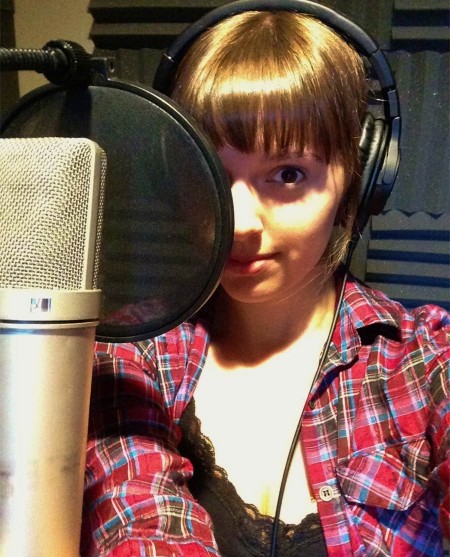Recording Connection mentor
Kevin McCarthy, owner and chief producer/engineer at
Cityview Recording in Salem, Oregon, has an interesting take on apprenticing students for the music industry. Also an accomplished singer/songwriter and musician, Kevin has more than three decades of experience on both sides of the glass, having opened for Jefferson Starship, performed onstage with Buddy Jewell, Julie Roberts and the late Rod Price (of Foghat), and recorded and mixed for such clients as Amy Clausen, Lonesome Road and Deen Castronovo (Journey).
As such, Kevin takes a particularly musical, well-rounded approach to teaching his apprentices. In the excerpts below, taken from a recent conversation we had with him, you can see he’s all about his students and preparing them for the music industry! He also has some very cool things to say about the Recording Connection master’s program, as well as the level of passion it takes to make it in this business. Some very insightful and even vulnerable moments ahead, so read on!
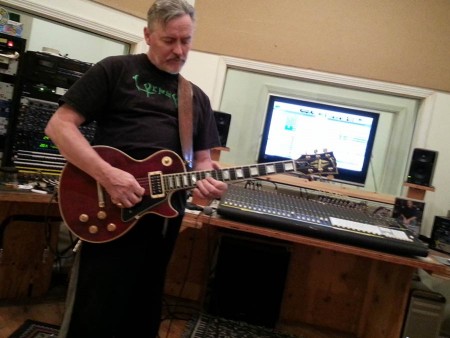
RC Mentor Kevin McCarthy
“I think that a lot of engineers are musicians first and songwriters and I’ve had some success at that, and as I built a studio for myself, I began to get other people coming in and I was recording them… So song structure is really a lot of what I teach as well, because I’m a musician and songwriter first, and the studio came out of that. So now I have to play both first and second base in that we have to be able to put the songs together and have good structure with the songs and tracking them, and then also be able to work in post and make sure that what we really had as a conception comes to fruition…I think that a lot of people really want to be here just because of my success in terms of songwriting and radio play.”
ON WHAT HE SPECIFICALLY TRIES TO IMPART TO HIS STUDENTS:
So I want the students to understand that they are at the threshold of a new era in that those changes have been made and have… have literally become permanent where we’re pulling tape out and we’re using emulations of things that are so good that nobody’s using tape anymore. So that’s what I want them to understand when they’re looking at their setups and their own personal setups that… here’s the example at Cityview Recording. Use this as a blueprint and a map to continue building your own scenario and to understand… So that gives them an edge, so they come in and don’t have a blank look on their face when they enter another studio and see exactly what’s going on. They’re going to know because they saw us do it at Cityview.
HIS THOUGHTS ON THE KIND OF PASSION REQUIRED TO MAKE IT IN THE MUSIC INDUSTRY:
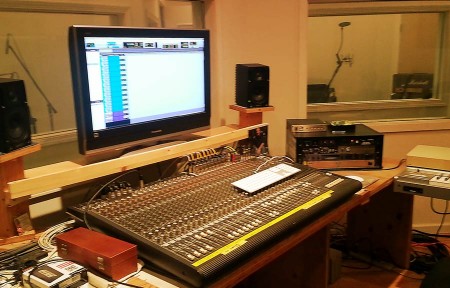
Control Room in Cityview Recording
“If you don’t love this, it’s not going to happen….At some point in time you’ve got to separate your infatuation from it and become obsessed with it. And if you look at all the big guys, from Schultz to Pensado, CLA, JJP, Al Schmitt, all these top guys, and there are many others…these guys, like me, you can’t stop us: we’re going to do it whether it’s cool or not. I love… what is most fascinating about it to me is that we take all of these pieces, which we now at Cityview capture so eloquently with this incredible outboard equipment and mic collection that we have, and then we go to post and we make it happen, and we make it sound like you really feel we ought to make it sound. And I can feel it, you know—it’s not a matter of numbers, it’s a ‘how does make me feel when I’m mixing it?’ And when I get it mixed, that really is what drives me. It’s like making a cake: you just want that cake to be the best cake you ever, ever tasted, and that is every session, every song, and it drives me. I consider myself very lucky.
“…You know, a lot of guys say they’re all wanting to be engineers and blah, blah, blah, but I really think that, you know, there’s talk and there’s do. And my students are in the “do” mode where they’ve invested in their education and they’re… they’ve come here and they’re working really hard with me to pass these exams and sometimes I have to help them a little bit, but we’ve got some pretty strong students here who are really getting it down, and I’m very proud of them.”
BRAGGING ON SOME OF HIS STAR APPRENTICES:
“I’m pretty proud of almost of all of them. I’ve got Carson Sykes who has graduated and has his start; I’ve got that in his file, he’s down in Los Angeles now at a pretty big studio…Dan Cobos, he’s almost on the last lesson… Cobos wants to be on the Master’s program…Austin House has been spectacular, his grades are just, he’s almost straight A. Ramiro Garcia is really, really, really good as well…Taylor Sewell…I’ve got some students that are really surprising me.”
ON WHY HE THINKS STUDENTS NEED TO CONTINUE BEYOND THE BASIC APPRENTICESHIP PROGRAM INTO THE MASTER’S PROGRAM:
“These kids need to move on to the master’s program because the master’s program is really where you get to a point where you could be a more important component in a tracking session, setup, those types of things. The basics are excellent with the associates program, but the master’s program…is pretty much what I do every day, so these kids will… these kids I think will benefit greatly from it.”
ON WHY HE ENDORSES RRF’S MENTOR-APPRENTICE APPROACH OVER TRADITIONAL EDUCATION:
“I just think it’s way better, the students at RRF are getting an education they just wouldn’t get any other way. When they’re here, we’re actually recording records. And I’m also a producer, songwriter, and a lot of my clients literally come to me to help them perfect their songs that they’ve put together, and I think the students really get to see something more than just an engineer sitting here, they’re watching a songwriter at work and a tracking expert at work, and then we go to mix, and post is always fun because it’s… they get to look at the back of my head for a long time! [laughter] …These guys at RRF have been good to me…it’s been fantastic knowing these guys and quite frankly, I was very honored to have been the guy that they chose in this area.”

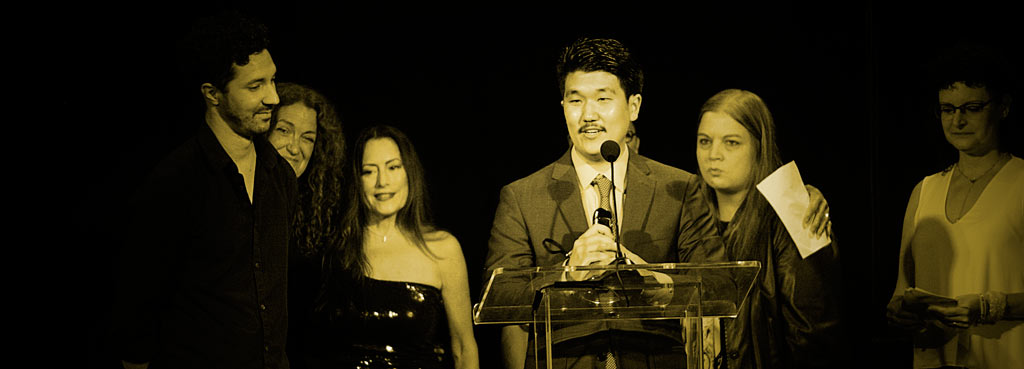
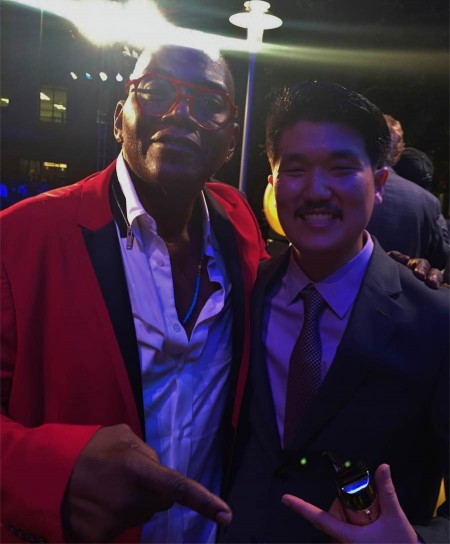
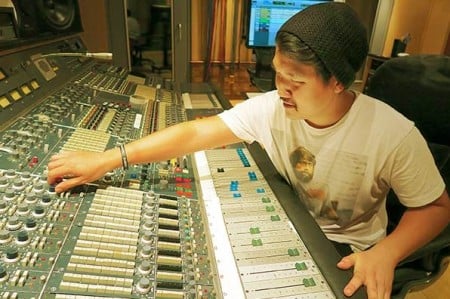
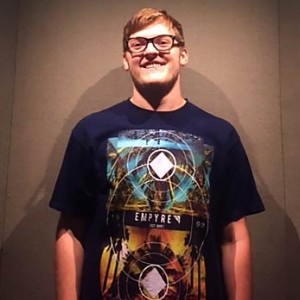
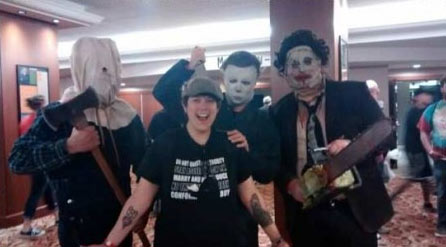 Thanks to her passion for writing for cinema, Film Connection student and horror film aficionado Danni Winn (San Antonio, TX) just completed coverage for not one, but two amazing film festivals: MondoCon 2015, featuring artists, creators, panels, screenings and more; and Fantastic Fest 2015, the largest horror/fantasy/sci-fi film festival in the U.S.!
Thanks to her passion for writing for cinema, Film Connection student and horror film aficionado Danni Winn (San Antonio, TX) just completed coverage for not one, but two amazing film festivals: MondoCon 2015, featuring artists, creators, panels, screenings and more; and Fantastic Fest 2015, the largest horror/fantasy/sci-fi film festival in the U.S.!
